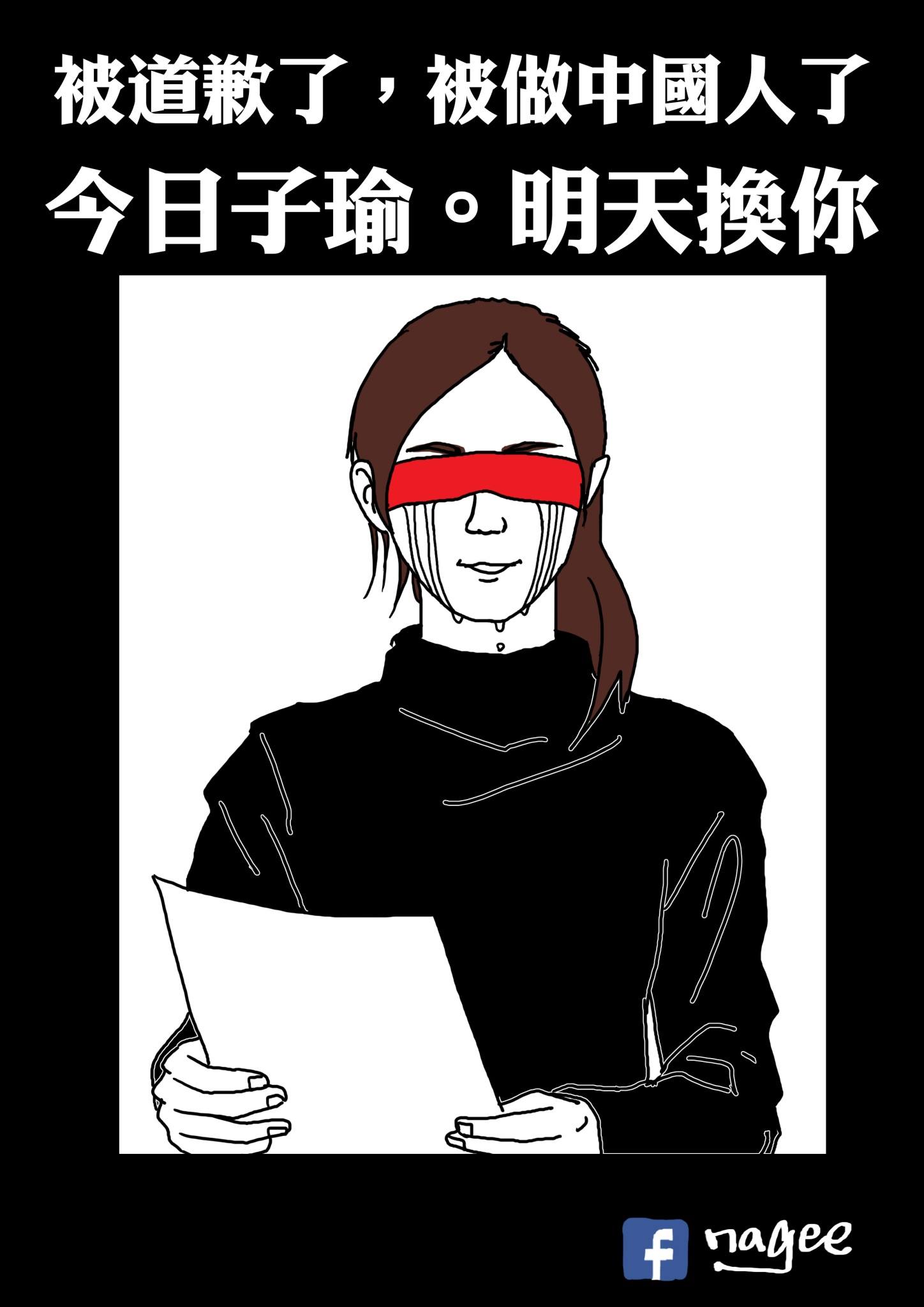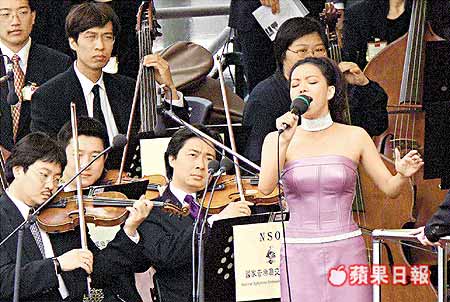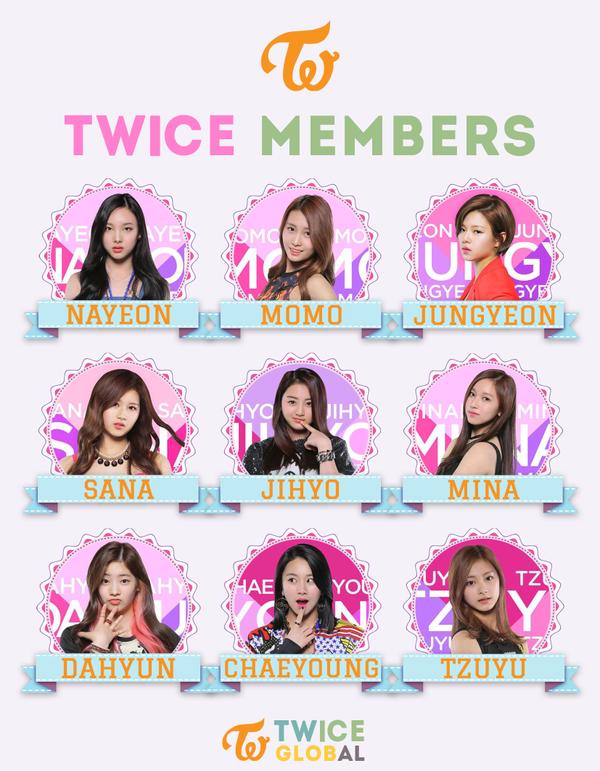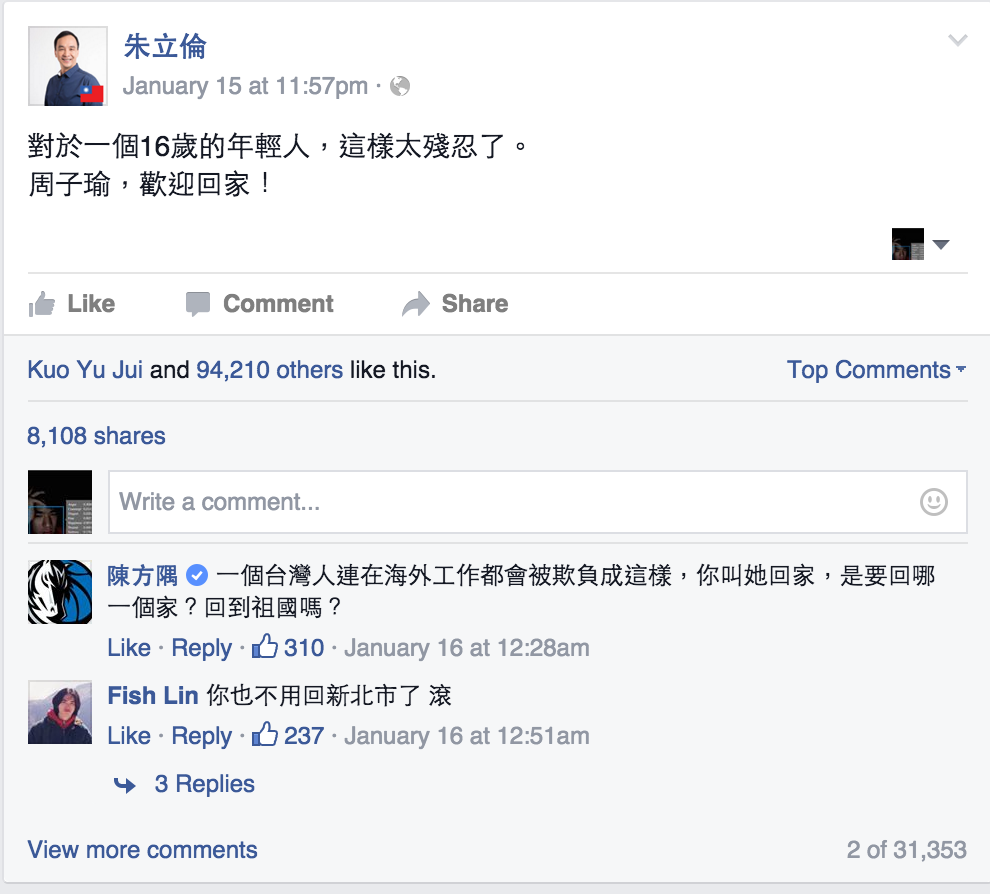by Brian Hioe
語言:
English
Photo Credit: Video Recording
A VIDEO OF 16-year-old Taiwanese K-pop performer Chou Tzuyu unexpectedly went viral in Taiwan the day before 2016 presidential elections. In the video, Chou apologized for a previous online video in which Chou held the flag of the Republic of China—the name by which Taiwan is internationally known. In the video, Chou apologized for her transgressions, stressed that she was Chinese as well as the unity of a singular China. The video was released on January 15th, the day before 2016 presidential elections in Taiwan on January 16th.
On the basis of holding a Republic of China flag in the video, Chou was accused of supporting Taiwanese independence by infamous entertainer Huang An. Huang, like Chou, is a performer and hails from Taiwan. Huang has since naturalized to Chinese citizenship and currently lives in China. We might note Chou did not actually work in China, but in South Korea. However, Huang An would post a gloating status update on Weibo about having rooted out Chou’s aspirations towards Taiwanese independence and how she is willing to “return to the motherland.”
 Internet meme comparing Chou to an ISIS hostage. Photo credit: Nagee
Internet meme comparing Chou to an ISIS hostage. Photo credit: Nagee
Though there was in fact some initial online backlash against Chou by individuals who saw Chou as having no spine in renouncing her Taiwanese identity, a wave of support for Chou and severe backlash against Huang An has since ensued. Chou is seen as a victim forced to apologize, with one online meme comparing Chou to ISIS hostages forced to apologize at gunpoint. The video of Chou has also been compared to recent release of a video of missing Hong Kong bookseller Gui Minhai on state-run television claiming that he had turned himself over to authorities for a hit-and-run incident in which he killed someone, when in actuality he was likely kidnapped by the Chinese government for publishing books critical of the Communist Party.
The Chinese Market Pull
IN PAST YEARS, there have been a number of Taiwanese entertainers who express Chinese identification in order to enter the Chinese market. We see the socioeconomic incentive of expressing Chinese identification for performers to enter the Chinese market, given that the Chinese market is much larger than the Taiwanese one. Indeed, the Chinese market is a large consumer of K-Pop. It appears that Chou was forced to apologize by her Korean managers. Very likely, Chou’s managers feared for the viability of K-Pop idol group Twice, of which Chou is a member, after backlash from Chinese consumers, so forced Chou to apologize.
After all, apart from that individuals who are seen as supporting Taiwanese independence may suffer backlash or public boycott, the Chinese state can ban individuals who are too critical of the government from reentering China. Pop singer A-Mei was banned from China for singing at the inauguration of independence-leaning president Chen Shui-Bian. Likewise, Freddy Lim, frontman of the heavy metal band Chthonic and a newly minted legislator in Taiwanese elections, is banned from China because of having openly expressed support for Taiwanese independence through song.
 A-Mei performing at Chen Shui-Bian’s inauguration. Photo credit: Apple Daily
A-Mei performing at Chen Shui-Bian’s inauguration. Photo credit: Apple Daily
Chou is a member of multinational K-Pop group Twice, which is composed of individuals from Japan, South Korea, and Taiwan. Members of Twice were chosen through a contest on the reality television show Sixteen. Chou was one of the victorious contestants that made it all the way to the final selection for Twice. Actually, as Chou was one of the winners of Sixteen, it was initially a matter of national pride for Taiwan that a Taiwanese contestant would make it all the way to the end of an international idol competition.
Although the present incident has come to public attention because of issues of Taiwan being denied a place in the world because of Chinese influence, the issue raises broader questions about the stringent controls placed on members of female idol groups. The female idol group is a pop cultural phenomenon particular to K-Pop and J-Pop and seems to originate from Japan, where K-Pop follows in the footsteps of J-Pop.
 Members of multinational K-Pop group Twice, of which Tzuyu is a member. Photo credit: Twice Global
Members of multinational K-Pop group Twice, of which Tzuyu is a member. Photo credit: Twice Global
Apart from that female idol groups are subject to harsh training programs to keep them in shape for dance and song routines by management, members of female idol groups have strict regulations placed upon them by management and sometimes forced to publicly humiliate themselves when they break regulations. These obligations may be contractual in nature. In a famous incident, Minami Minegeshi of dominant J-Pop idol group AKB48, then 20, would be forced to shave her head and publicly apologize after being caught spending a night with her boyfriend when band regulations forbade dating. It was required that young pop idols, as sexualized objects in the public eye, preserve an image of innocence. Given the harsh conditions placed upon idols, Japanese labor commentator Hifumi Okunugi would comment in the Japan Times, half in jest, half in seriousness, that Japanese pop idols should consider forming a labor union. And obviously, as a whole, the female pop idol is a rather problematic phenomenon where sexual objectification is concerned.
Taiwan vs. ROC
ACTUALLY IN THE case of Chou, waving the ROC flag in Taiwan would not normally be perceived as advocating Taiwanese independence. Taiwanese independence advocates typically do not identify with the ROC flag, seeing the ROC framework as a colonial regime which was brought over from China by the KMT. In fact, almost no Taiwanese independence advocate whatsoever would see Chou’s actions as endorsing Taiwanese independence or understand them as an expression of support for Taiwanese independence. Of course, it is that these distinctions are largely unknown among non-Taiwanese.
Given that the video of Tzuyu’s apology was released a day before elections, although one would expect the attention of the public to be focused entirely on presidential elections, the video nonetheless became an object of much public discussion. In fact, all three major presidential candidates in Taiwan would weigh in on the incident and express disapproval of the treatment of Chou.
 Eric Chu’s Facebook status about Chou. Photo credit: Eric Chu Facebook page
Eric Chu’s Facebook status about Chou. Photo credit: Eric Chu Facebook page
Surprisingly enough, this included the KMT and PFP, which are in favor of the unification of Taiwan and China. The KMT presidential candidate Eric Chu of all people would express sympathy for Chou and call for her to return home to Taiwan. There have even been those who have compared the Chou Tzuyu incident to the 2004 when DPP president Chen Shui-Bian and his running mate Annette Lu, who were seeking reelection, were shot the day before presidential elections. Namely, the view is that the Chou Tzuyu incident was inflaming of public sentiment against the KMT and a contributing factor to the KMT’s substantial loss in not only presidential, but legislative elections. When victorious, Tsai Ing-Wen would reference the incident in her victory declaration.
Some have also actually suggested that the incident may have prompted more people to go home and vote. There is also some commentary which suggests that more people may have voted DPP for their party in order to give it a clear win as a result of the incident, where voting DPP was thought to be coextensive with affirming Taiwanese national identity.
Some have pointed to the incident as an example of the failure of the KMT’s “1992 Consensus”, which asserts in international relations that there is one China, but the PRC and ROC governments differ on their interpretation of that China. This has been phrased as “One China, two interpretations.”
It would be that the 1992 Consensus seems useless if Chou’s Korean managers became anxious about the notion that there was anything which was not “One China” would be overly provocative, illustrating the ineffectual nature of asserting that there are “two interpretations” of that “One China.” In the end, it is only “One China” which remains, as we also saw in the November meeting of Taiwanese president Ma Ying-Jeou and Chinese president Xi Jinping in Singapore in which the “1992 Consensus” was only raised in terms of a “One China Principle,” without reference to the “two interpretations” aspect.
The ire of Taiwanese netizens has clearly been raised, as we also see in subsequent backlash against Show Luo, Taiwanese singer and actor, after claiming at an awards ceremony in Beijing that “We are all Chinese.” Show’s comments prompted applause from the audience, but have led to criticisms in Taiwan, with individuals mocking him through urging him to naturalize to China in the same manner as Huang An.
The Chou incident is reminiscent of an early incident in which beauty pageant contestant Ting Wei-Yin was kicked out of the Miss World contest for refusing to wear a sash that said “Miss Chinese Taipei.” This prompted much support from Taiwanese for Ting. But Show drew the ire of Taiwanese for claiming to be Chinese where Chou drew support for the same, as the perception was that Chou had been forced into the apology but Show’s expression of Chinese identification was willing. Chou’s youth and seeming reluctance to apologize in the video was probably another factor. But in general, we see how pop entertainment has become yet another arena of contestation in the struggle to preserve Taiwan national identification.


 Internet meme comparing Chou to an ISIS hostage. Photo credit: Nagee
Internet meme comparing Chou to an ISIS hostage. Photo credit: Nagee A-Mei performing at Chen Shui-Bian’s inauguration. Photo credit: Apple Daily
A-Mei performing at Chen Shui-Bian’s inauguration. Photo credit: Apple Daily Members of multinational K-Pop group Twice, of which Tzuyu is a member. Photo credit: Twice Global
Members of multinational K-Pop group Twice, of which Tzuyu is a member. Photo credit: Twice Global Eric Chu’s Facebook status about Chou. Photo credit: Eric Chu Facebook page
Eric Chu’s Facebook status about Chou. Photo credit: Eric Chu Facebook page